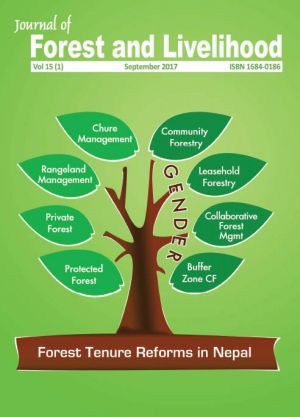Political Economy of Forest Tenure Reform Implementation in Nepal: The Case of Protected Forests
DOI:
https://doi.org/10.3126/jfl.v15i1.23089Keywords:
Community forest, Nepal, protected forest, right holders, tenure securityAbstract
Protected forest is a new approach to forest management in Nepal. The programme targets natural forest areas that have high biodiversity, scientific and cultural values but are not covered by the country’s protected area network. So far, eight biodiversity-rich natural forest areas and biological corridors, covering a total area of 133,754.8 hectares (ha) are being managed under this regime, and eight other forests, covering a total area of 194,907.9 ha are in the process of being declared as protected forests in the near future. By reviewing existing literature, policy, legislation and management plans, this paper makes a critical analysis of the protected forest management regime from political economy perspective with special focus on the rights offered to local communities, benefit sharing arrangements and tenure security. Mismatch among the law, policy, and practice; lack of legal clarity on the role, responsibility and authority of stakeholders; unclear benefit sharing arrangement; non-clarity about the rights of non-state right holders; and difference in perceptions of tenure arrangements among the stakeholders are some of the specific issues and challenges related to the management of protected forest. Some other contestations relate to division of authority, and benefits sharing between the government and local communities. There is a need to amend the Forest Act 1993 and Forest Regulations 1995, especially to clarify the legal status of the protected forest council, and address the issues of benefit sharing between the central government and local stakeholders. Another important need relates to adopting a flexible policy and implementation approach to address the contextual differences among different protected forest sites located in different physiographic zones across Nepal.
Downloads
Downloads
Published
How to Cite
Issue
Section
License
CC-BY-NC: This license allows reusers to distribute, remix, adapt, and build upon the material in any medium or format for noncommercial purposes only, and only so long as attribution is given to the creator.





